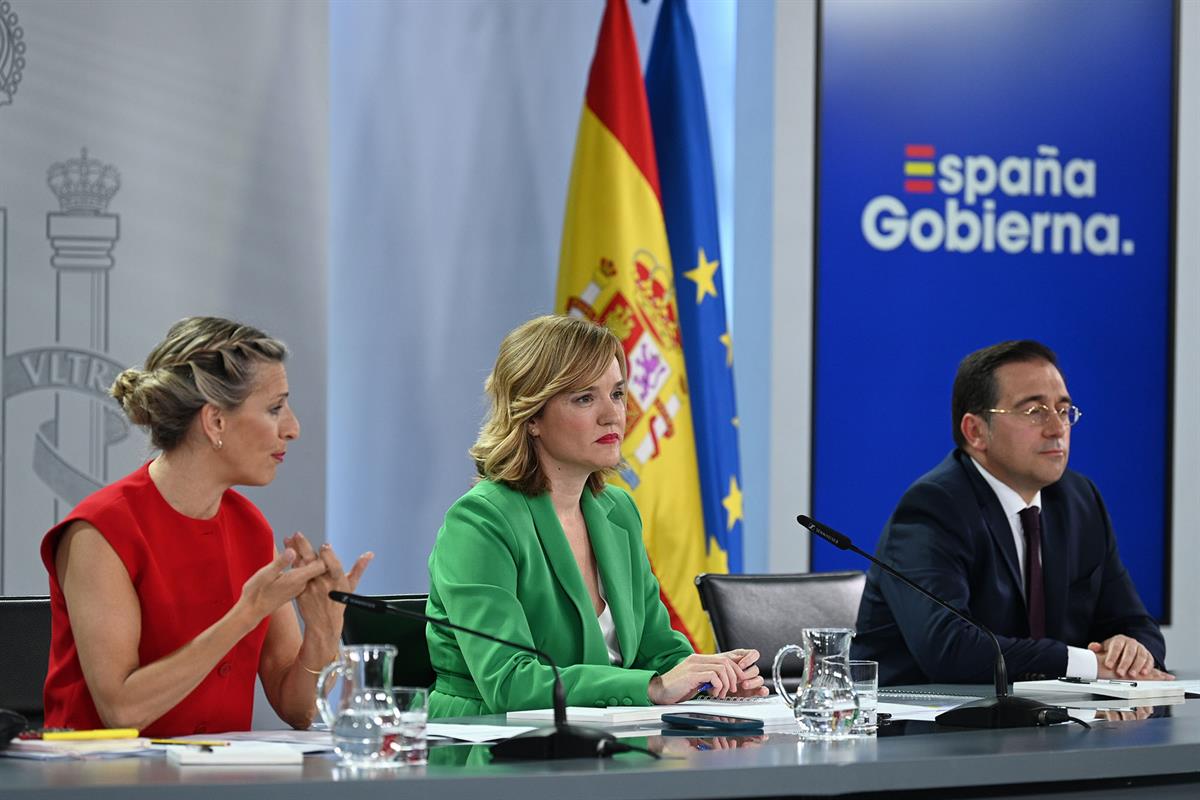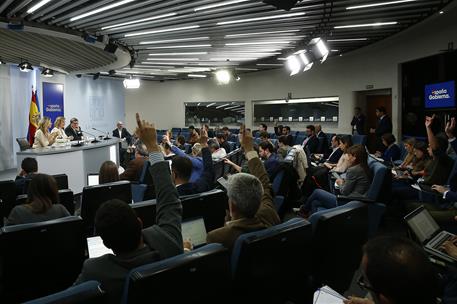Council of Ministers
The Government of Spain improves and simplifies unemployment benefit protection
Council of Ministers - 2024.5.21
Moncloa Palace, Madrid
 Yolanda Díaz, Pilar Alegría, and José Manuel Albares, during the press conference after the Council of Ministers (Pool Moncloa/Borja Puig de la Bellacasa)
Yolanda Díaz, Pilar Alegría, and José Manuel Albares, during the press conference after the Council of Ministers (Pool Moncloa/Borja Puig de la Bellacasa)
The Council of Ministers has approved a Royal Decree-Law to simplify and improve the level of unemployment benefits, thereby complying with the reforms committed to with the European Commission in Component 23 of the Recovery, Transformation and Resilience Plan. This legislative provision will have to be validated by the Lower House of Parliament within 30 days of its enactment.
The Second Vice-President of the Government of Spain and Minister for Work and Social Economy, Yolanda Díaz, explained that the first major new item of the reform is the creation of a subsidy for women over the age of 16 who are victims of sexual and sex-based violence, with the same amounts as the ordinary one. The second new feature is that workers who take advantage of the new welfare model will be able to combine unemployment benefits and allowances with work. In addition, the regulation will allow students who receive grants to combine them with unemployment benefits.
The reform extends subsidies to groups that previously lacked this coverage, such as those under 45 years of age without family responsibilities, temporary agricultural workers and cross-border workers, as explained by the vice-president.
In addition, Díaz stressed that the regulation raises the percentage of the public multiple effects income indicator (IMPREM) used to calculate the subsidy, which will increase its amount by 90 euros per month. The increase of 90 euros per month will mean that in entire regions throughout the country "hundreds of people who live on unemployment benefit will see their situation improve", she remarked.
In this context, the second vice-president defended the fact that this measure is not a "little payment", but rather the social rights of workers who are paying contributions so that Spain has the level of protection it has. In addition, she pointed out that 80% of those receiving unemployment benefit do not exhaust the benefit.
Moreover, the regulation simplifies and facilitates the processing and recognition of benefits for beneficiaries. People who have exhausted their contributory benefit will not have to wait a month to apply for benefit.
Yolanda Díaz also stressed that the law has a gender impact because it is especially working women who receive unemployment benefits. In addition, part-time workers will be guaranteed the same rights as full-time employees, as deductions will be eliminated.
During her speech, the Minister for Work and Social Economy stressed that "we are growing economically and we are doing so through work", something that had never happened before in our country, and that "workers are once again gaining rights and democracy is expanding" thanks to social and institutional dialogue.
In this respect, Díaz thanked the political parties, the trade unions and the employers' association - which did not sign the agreement, but was part of the social dialogue table - for their contribution to the drafting of these legislative tools.
After recalling that Spain has 21 million people in employment and has a temporary employment rate below the European average, the Second Vice-President said that this month's employment figures "are also going to be very favourable".
Elimination of automatic dismissal for permanent disability
 The Second Vice-President of the Government of Spain and Minister for Work and Social Economy, Yolanda Díaz, during the press conference after the Council of Ministers
The Second Vice-President of the Government of Spain and Minister for Work and Social Economy, Yolanda Díaz, during the press conference after the Council of Ministers
The Government has approved the reform of Article 49.1.e of the Workers' Statute, which will prevent workers who become permanently, totally, absolutely or severely disabled from being automatically dismissed, which is currently the case.
Yolanda Díaz stated that "telling someone that, because they suffer from a disability of a permanent nature in different degrees, they have to be dismissed, means the civil death of this person", something that the reform is going to correct.
From now on, the disabled person will be able to choose whether to terminate their employment relationship or to remain in the job, in which case the company will be obliged to make reasonable adjustments to adapt the job. The employee may also request a change to another vacant and available post, in line with their professional profile and compatible with their new situation.
The approved text, which reflects the agreement reached with the Spanish Committee of Representatives of People with Disabilities (CERMI), specifies the criteria for determining which costs are assumable for companies to adjust jobs and which could be covered by public aid or subsidies in part and in full.
Support for the production of feature films
The Minister for Education, Vocational Training and Sports and Government Spokesperson, Pilar Alegría, has announced that the Council of Ministers has authorised 30 million euros in aid for the production of feature-length films on the project. The aim of this aid, to be announced by the Instituto de la Cinematografía y de las Artes Audiovisuales, is to improve the industrial fabric of film companies operating in the sector.
As Alegría explained, the specific objective of this initiative is to support projects that have a special cinematographic, cultural or social value, whether documentary or experimental in nature, or that incorporate new filmmakers. The call also pays special attention to the production of audiovisual works using innovative technologies, such as animated films.
The maximum amount of support may not exceed 800,000 euros per project or 1 million euros in the case of animation projects. A minimum of 40% of the budget will be earmarked for projects made exclusively by female directors; a minimum of 15% and a maximum of 25% for documentary projects; and a minimum of 10% for animation projects. "This is yet another of the support that this Government has been giving to the artistic and cultural sector in our country," concluded the minister.
Assistance and protection for Spaniards abroad
 The Minister for Foreign Affairs, European Union and Cooperation, José Manuel Albares, during the press conference after the Council of Ministers | Pool Moncloa/José Manuel Álvarez
The Minister for Foreign Affairs, European Union and Cooperation, José Manuel Albares, during the press conference after the Council of Ministers | Pool Moncloa/José Manuel Álvarez
The Minister for Foreign Affairs, European Union and Cooperation, José Manuel Albares, has presented the Consular Activity Summary 2023 in the Council of Ministers, which covers the services provided to Spaniards abroad.
The minister highlighted the growth of this group, which has doubled since 2009 and is now close to 3 million people, most of them in America (59%) and Europe (38%). The consular offices also deal with Spaniards who travel to other countries for tourism, business or other reasons.
Emergencies, sex-based violence and conflict
A fundamental part of consular activity is directed towards Spaniards who suffer situations of special vulnerability, starting with those who are detained abroad: in 2023 there were 940 prisoners, 823 men and 117 women. In addition, last year the consular offices dealt with 8,800 emergency cases, and 160,000 calls from Spaniards abroad seeking information were received on the telephone numbers provided.
In order to help prevent these emergencies, the Ministry of Foreign Affairs makes several tools available: the continuous updating of travel recommendations, the most visited section of its website; the contingency and evacuation plans that all embassies have; and the register of travellers where any citizen travelling abroad can register in order to be reachable, a tool that 142,000 people used in 2023, 30% more than the previous year.
In addition, José Manuel Albares explained that for years the consulates have been specifically attending to female victims of violence, a particularly vulnerable group due to lack of knowledge of the reality of the country or the language or because, on occasions, there is no protection against this type of violence or it is not classified as a crime. In 2023, this care reached 428 women, and 26 women and 14 minors were repatriated to Spain.
The minister pointed out that in recent years the "convulsion of the international scene" has forced the evacuation of Spanish people from various countries, as occurred in 2023 due to the civil war in Sudan, the coup d'état in Niger, the Hamas terrorist attacks in Israel and the war in Gaza.
Day-to-day procedures and legislative reforms
Consular activity also includes all the procedures that Spaniards living abroad need to carry out their lives normally, such as the issuing of passports (more than 388,000 in 2023) or birth, death and marriage registrations (more than 156,000 in the same year).
Last year consulates also issued 1,609,000 visas for foreign nationals to travel to Spain, 20% more than the previous year. The vast majority, 85%, were short-term, and 6% were study visas, a percentage that is growing year on year.
The minister highlighted the improvement that two legislative initiatives have brought about for citizens abroad. On one hand, the reform of overseas voting to streamline procedures; it was implemented for the first time in the general election and in the regional elections last year and has doubled the turnout figures. On the other hand, the Law on Democratic Memory, which allows a large group of people to apply for Spanish nationality: as of 31 December 2023, more than 226,000 applications had been received in the consular network and 69,421 registrations had been made in the civil registers.
Albares pointed out that the consular network is immersed in a digitisation process using funds from the Recovery Plan. Pilot projects have already started in three countries.
Recalling of the Spanish ambassador in Buenos Aires
With reference to the statements made on 19 May in Madrid by the Argentine president, Javier Milei, the foreign minister said that this was a unique case in the history of international relations. "There is no precedent for a head of state coming to the capital of another country to insult its institutions and to interfere blatantly and in the eyes of the whole world in its internal affairs," he said.
José Manuel Albares also stressed that the Government of Spain offered "in good faith all the hospitality that the figure of the president of the Argentine Republic deserves" and made the Torrejón air base and the necessary security available.
In the absence of a public apology from the Argentine president, the minister announced the recall of the Spanish ambassador in Buenos Aires and stated that the Government will analyse a possible trip by Javier Milei to Spain to receive an award on 21 June "in detail". "We have no desire or interest in any escalation, but it is the Government's obligation to defend the dignity and sovereignty of Spanish institutions," he said.
Economic news: foreign debt reduction
 The Minister for Education, Vocational Training and Sports and Government Spokesperson, Pilar Alegría, during her speech at the press conference after the Council of Ministers | Foto: Pool Moncloa/Borja Puig de la Bellacasa
The Minister for Education, Vocational Training and Sports and Government Spokesperson, Pilar Alegría, during her speech at the press conference after the Council of Ministers | Foto: Pool Moncloa/Borja Puig de la Bellacasa
During her speech at the press conference, the government spokesperson welcomed the data published today on the reduction of foreign debt. According to Alegría, this is "good news" that reflects the "strength" and "competitiveness" of the Spanish foreign sector, and "reinforces Spain's financial position".
The spokesperson, who once again recalled in this context the figure of Social Security membership, underlined the impact of these figures on economic growth. "Spain is growing and extending rights", she pointed out, with "a model of a country that improves people's present and also strengthens the future".
Non official translation





